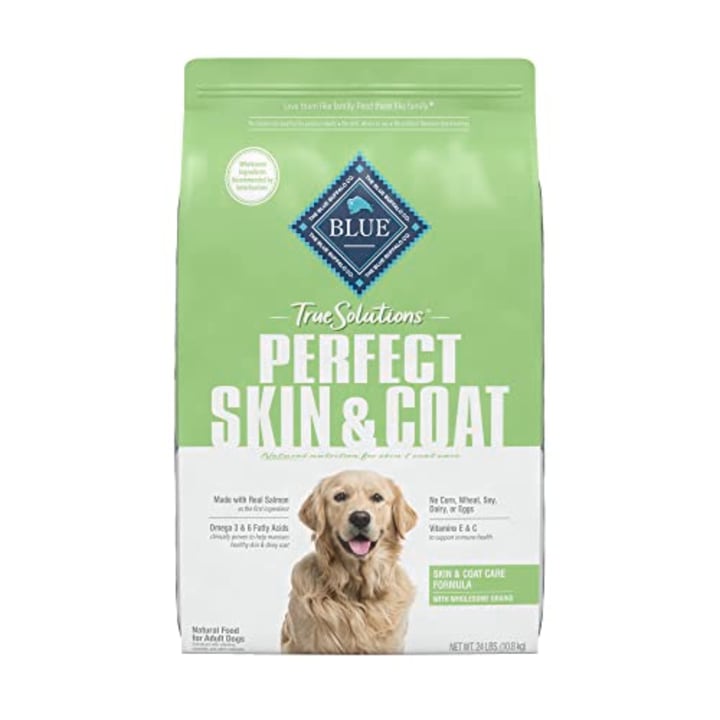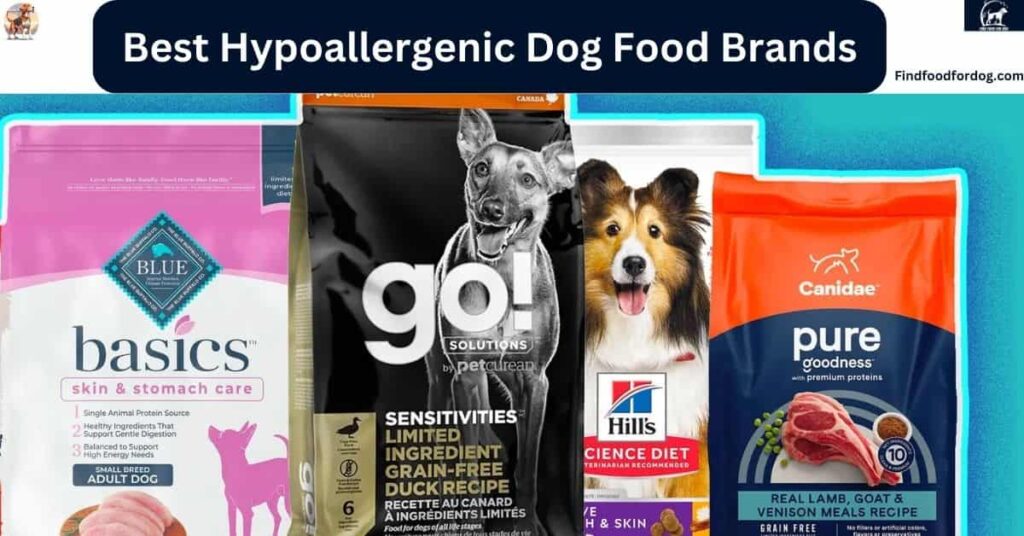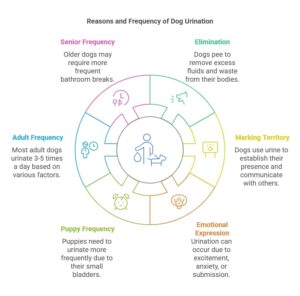Some of the best hypoallergenic dog food brands include Royal Canin, Hill's Prescription Diet, and Blue Buffalo. These brands offer specialized formulas to reduce allergic reactions and promote better health.
Hypoallergenic dog food is essential for pets with food sensitivities or allergies. Many dogs experience discomfort from common ingredients like grains and certain proteins. Choosing the right food can alleviate symptoms such as itching, digestive issues, and skin irritations. Quality hypoallergenic options use limited ingredients or novel proteins, making them easier to digest.
These diets not only improve your dog’s well-being but also support a healthy coat and skin. Selecting a reputable brand ensures your furry friend receives the nutrition they need without triggering allergies, leading to a happier, healthier life.
Table of Contents
ToggleSensitive Pups And Their Diet

Dogs with food sensitivities need special attention to their diet. Choosing the right food helps maintain their health and happiness. Hypoallergenic dog food can reduce allergic reactions. This diet focuses on simple ingredients that are less likely to cause issues.
Common Signs Of Food Allergies In Dogs
Recognizing food allergies is crucial for your pup's well-being. Here are some common signs to watch for:
- Itchy Skin: Frequent scratching or biting at the skin.
- Ear Infections: Recurring ear problems or foul odor.
- Digestive Issues: Vomiting or diarrhea after eating.
- Red or Inflamed Skin: Areas of redness or irritation.
- Hair Loss: Unexplained bald patches on the body.
The Importance Of Choosing Hypoallergenic Foods
Selecting hypoallergenic dog food is essential for sensitive pups. These foods contain fewer allergens and are often made with limited ingredients. Here are some benefits of hypoallergenic dog foods:
| Benefit | Description |
|---|---|
| Reduced Allergic Reactions | Minimizes the chance of allergic responses. |
| Better Digestive Health | Supports a healthy gut and digestion. |
| Improved Skin Condition | Can help lessen itching and irritation. |
| Increased Energy Levels | Promotes overall vitality and well-being. |
Hypoallergenic foods often use novel proteins. These are meats your dog has not eaten before. This approach can prevent allergic reactions and improve health.
:strip_icc()/oneplus_sensitive-c831eb0f80914383989f1ccf8b2bd528.jpeg)
Purina Pro Plan
Decoding Hypoallergenic Dog Food
Choosing the right dog food is crucial for your pet's health. Hypoallergenic dog food is designed to reduce allergic reactions. It focuses on specific ingredients to minimize sensitivities.
What Makes A Dog Food Hypoallergenic?
Hypoallergenic dog food avoids common allergens. These can include:
- Beef
- Chicken
- Dairy
- Wheat
- Eggs
Instead, hypoallergenic formulas use alternative proteins. They may feature:
- Fish
- Lamb
- Rabbit
This helps dogs with food allergies feel better. Less irritation leads to healthier dogs.
Key Ingredients To Look For
When selecting hypoallergenic dog food, consider these key ingredients:
| Ingredient | Benefit |
|---|---|
| Novel Proteins | Reduces allergic reactions. |
| Grain-Free Carbohydrates | Prevents digestive issues. |
| Omega Fatty Acids | Supports skin health. |
| Probiotics | Enhances gut health. |
Read labels carefully. Look for high-quality ingredients. Avoid fillers and artificial additives.
Consult your vet before switching dog food. They can recommend the best options for your pet.
Top Hypoallergenic Dog Food Brands
Choosing the right hypoallergenic dog food brand is vital for your pet's health. Many dogs suffer from food allergies. The best hypoallergenic dog food can help alleviate discomfort. Here are some top brands that cater to your furry friend's dietary needs.
Premium Choices For Your Dog
Premium hypoallergenic dog food often features high-quality ingredients. These brands typically use limited ingredients to reduce allergens. Here are some top premium options:
| Brand | Main Ingredients | Key Features |
|---|---|---|
| Royal Canin | Hydrolyzed protein | Vet-recommended, highly digestible |
| Hill's Science Diet | Chicken meal, brown rice | Balanced nutrition, sensitive stomachs |
| Blue Buffalo Basics | Turkey, potato | Grain-free, no artificial additives |
Royal Canin
Hill's Science Diet
Blue Buffalo
Value Picks: Quality Meets Affordability
Value brands offer quality hypoallergenic food without breaking the bank. These options provide balanced nutrition at a lower price. Check out these value picks:
- Purina Pro Plan – Offers high protein content at an affordable price.
Purina Pro Plan
- Natural Balance – Known for its limited ingredient diet.
Nature's Recipe
- Wellness Simple – Features real meat as the first ingredient.
Wellness CORE
These brands ensure your dog gets the nutrients they need. Affordable doesn't mean compromising on quality. Choose wisely for your furry companion.
Grain-free Options
Choosing grain-free dog food can greatly benefit your pet. Many dogs have sensitivities to grains. These sensitivities can cause skin issues or digestive problems. Grain-free diets use alternative ingredients like peas, potatoes, and lentils. This can lead to healthier, happier dogs.
Benefits Of Going Grain-free
- Improved Digestion: Grain-free diets are easier to digest.
- Healthier Skin: Reduces allergic reactions and skin issues.
- More Energy: Dogs often have increased energy levels.
- Better Weight Management: Helps maintain a healthy weight.
- Fewer Allergies: Reduces the risk of food-related allergies.
Best Grain-free Brands On The Market
| Brand | Key Features | Protein Source |
|---|---|---|
| Blue Buffalo Wilderness | High protein, natural ingredients | Chicken, Fish |
| Canidae Pure | Limited ingredients, high quality | Salmon, Bison |
| Wellness CORE | Grain-free, high protein | Turkey, Chicken |
| Merrick Grain-Free | Real whole foods, no fillers | Beef, Chicken |
| Orijen | Biologically appropriate, fresh ingredients | Multiple meats |
Blue Buffalo
Canidae PURE
Wellness CORE
Merrick
Orijen Original
Novel Protein Sources
Novel protein sources are essential for dogs with food allergies. They help reduce allergic reactions and provide balanced nutrition. Many dogs thrive on these unique proteins. Let's explore some alternative options and the leading brands that utilize them.
Exploring Alternative Proteins
Alternative proteins come from unusual animal sources. These proteins can prevent allergic responses. Some common novel protein sources include:
- Duck
- Venison
- Rabbit
- Quail
- Fish
These proteins provide various amino acids. They support healthy growth and energy levels. A varied diet keeps your dog excited at mealtime.
Leading Brands With Novel Proteins
Many brands offer hypoallergenic dog food featuring novel proteins. Here are some top choices:
| Brand | Protein Source | Key Features |
|---|---|---|
| Blue Buffalo | Duck | Grain-free, natural ingredients, no artificial additives |
| Canidae | Venison | Multiple protein sources, high-quality grains, probiotics |
| Wellness Core | Rabbit | High protein, grain-free, antioxidant-rich |
| Nature's Logic | Fish | Whole foods, no synthetic vitamins, nutrient-dense |
Blue Buffalo
Canidae PURE
Wellness CORE
Nature
Choosing a brand with novel proteins can help your dog thrive. Always consult your vet before making dietary changes. A proper diet keeps your furry friend healthy and happy.
Customizable Dog Food Solutions
Customizable dog food solutions offer tailored nutrition for your furry friend. These options cater to individual dietary needs. Dogs with allergies or sensitivities benefit greatly from personalized meals. Custom dog food can ensure optimal health and happiness.
Tailored Nutrition For Individual Needs
Every dog has unique nutritional requirements. Factors include age, breed, weight, and health conditions. Customizable dog food can address specific issues such as:
- Food allergies
- Skin sensitivities
- Weight management
- Digestive problems
By focusing on specific needs, owners can help their pets thrive. Tailored nutrition promotes better digestion and overall well-being.
Companies Offering Custom Dog Food
| Company | Features | Customization Options |
|---|---|---|
| PetPlate | Human-grade ingredients, vet-approved | Age, weight, allergies |
| Nom Nom | Fresh food, tailored recipes | Health needs, taste preferences |
| Petco | Wide variety, affordable options | Allergies, diet plans |
| PetMeds | Customized meal plans, quality ingredients | Age, breed, health concerns |
These companies provide excellent options for creating a custom diet. Owners can choose ingredients that suit their dog's needs. This approach fosters better health and happiness.
Wet Vs. Dry Hypoallergenic Dog Food
Choosing between wet and dry hypoallergenic dog food can be tricky. Each type has unique benefits. Understanding their pros and cons helps in making the right choice.
Pros And Cons Of Wet Food
Wet dog food offers several advantages:
- Moisture Content: Provides hydration, especially for picky drinkers.
- Taste: Usually more flavorful, appealing to many dogs.
- Soft Texture: Easier for older dogs or those with dental issues.
However, there are some downsides:
- Storage: Requires refrigeration after opening.
- Cost: Generally more expensive than dry food.
- Shelf Life: Shorter shelf life compared to dry food.
Pros And Cons Of Dry Food
Dry dog food also has its benefits:
- Convenience: Easy to store and serve.
- Cost-Effective: Usually cheaper than wet food.
- Dental Health: Helps reduce tartar build-up.
Yet, it’s not without disadvantages:
- Less Moisture: Can lead to dehydration if not enough water is given.
- Flavor: Some dogs may find it less tasty.
- Texture: Harder for dogs with dental problems.
| Type | Pros | Cons |
|---|---|---|
| Wet Food |
|
|
| Dry Food |
|
|

Wellness CORE
Transitioning To Hypoallergenic Food
Switching your dog to hypoallergenic food can improve their health. This process needs careful planning. A gradual transition helps prevent stomach issues. It also allows your dog to adjust to the new diet.
How To Introduce New Food
Start by mixing the new hypoallergenic food with their current food. Follow these steps:
- Day 1-3: 25% new food, 75% old food.
- Day 4-6: 50% new food, 50% old food.
- Day 7-9: 75% new food, 25% old food.
- Day 10: 100% new food.
This gradual change helps your dog adapt without digestive problems. Watch for any signs of allergies during this period. Signs include itching, vomiting, or diarrhea.
Monitoring Your Dog’s Reaction To New Diet
Observe your dog closely after the food change. Take note of their behavior and health. Look for:
- Changes in appetite
- Energy levels
- Skin conditions
- Digestive issues
Keep a journal of your dog’s reactions. Record any changes you notice. If issues arise, consult your veterinarian. They can provide guidance tailored to your dog's needs.
Supplements And Add-ons For Allergy Support
Finding the right hypoallergenic dog food is crucial. Supplements and add-ons can enhance nutrition and support your dog's health. These additions help manage allergies and improve overall wellness.
Essential Supplements For Allergic Dogs
Several key supplements can help dogs with allergies. They boost the immune system and reduce allergic reactions.
- Omega-3 Fatty Acids: Help reduce inflammation.
- Probiotics: Improve gut health and digestion.
- Quercetin: Acts as a natural antihistamine.
- Digestive Enzymes: Aid in nutrient absorption.
| Supplement | Benefits |
|---|---|
| Omega-3 Fatty Acids | Reduce inflammation and support skin health. |
| Probiotics | Enhance digestion and immune function. |
| Quercetin | Natural antihistamine for allergy relief. |
| Digestive Enzymes | Improve nutrient absorption for better health. |
Natural Additives For Enhanced Nutrition
Natural additives can improve your dog’s diet. These ingredients promote overall health and alleviate allergy symptoms.
- Turmeric: A powerful anti-inflammatory agent.
- Sweet Potatoes: Rich in vitamins and fiber.
- Pumpkin: Excellent for digestive health.
- Green Tripe: Nutrient-dense and supports gut health.
Consider these natural additives to enhance your dog’s nutrition:
- Mix turmeric into their food.
- Add mashed sweet potatoes for fiber.
- Incorporate pumpkin puree for digestion.
- Feed green tripe for extra nutrients.
Choose the right supplements and additives wisely. Consult your veterinarian for personalized recommendations.

Reading And Understanding Food Labels
Understanding dog food labels is essential for choosing the right hypoallergenic diet. Labels contain vital information that helps pet owners make informed decisions. Knowing how to read them ensures your dog gets the best nutrition.
Identifying Key Information On Packaging
Food packaging includes several important details. Key information can guide your choices. Look for the following:
- Ingredients List: Ingredients are listed in order by weight. The first few should be high-quality proteins.
- Guaranteed Analysis: This shows the percentage of protein, fat, fiber, and moisture. It helps compare different brands.
- Feeding Guidelines: Follow these to ensure proper portion sizes. Overfeeding can lead to health issues.
- Allergen Information: Look for any potential allergens. Hypoallergenic foods should avoid common triggers.
Red Flags And Misleading Claims
Many brands use clever marketing. Some claims can be misleading. Watch out for these red flags:
- “Natural” or “Holistic”: These terms lack regulation. They don’t guarantee quality or safety.
- Vague Ingredients: Phrases like “meat by-products” can hide low-quality components. Always seek specific ingredients.
- “Grain-Free” Claims: Not all dogs need grain-free diets. Consult your vet before switching.
- Exaggerated Benefits: Claims like “miracle” or “cure” are often false. Look for science-backed information.
Understanding these elements helps in choosing the best hypoallergenic dog food. Always prioritize your dog's health and well-being.
Frequently Asked Questions On Best Hypoallergenic Dog Food Brands
What Is Hypoallergenic Dog Food?
Hypoallergenic dog food is specially formulated to minimize allergic reactions in dogs. It typically contains limited ingredients and avoids common allergens. These foods are beneficial for dogs with sensitivities to certain proteins, grains, or additives. Choosing hypoallergenic options can help improve your dog's overall health and well-being. Best Hypoallergenic Dog Food Brands
How Do I Know If My Dog Needs Hypoallergenic Food?
If your dog shows signs of allergies, hypoallergenic food may be necessary. Symptoms can include itching, skin irritation, or gastrointestinal issues. Consult your veterinarian for a proper diagnosis. They may recommend an elimination diet to identify specific allergens affecting your pet. Best Hypoallergenic Dog Food Brands
Are All Hypoallergenic Dog Foods The Same?
Not all hypoallergenic dog foods are the same. Different brands use various protein sources and ingredients. Some may contain novel proteins like venison or duck, while others focus on grain-free formulations. It's essential to read labels and choose a food suited to your dog's unique needs.
Can I Make Homemade Hypoallergenic Dog Food?
Yes, you can make homemade hypoallergenic dog food. However, it's crucial to ensure it's nutritionally balanced. Consult your veterinarian for guidance on safe ingredients and proper proportions. Homemade diets can be beneficial but require careful planning to avoid deficiencies.
Conclusion
Choosing the right hypoallergenic dog food is essential for your pet's health. Each brand offers unique benefits tailored to specific dietary needs. Prioritize your dog's well-being by selecting high-quality ingredients. Always consult your veterinarian to ensure the best choice for your furry friend. Best Hypoallergenic Dog Food Brands
Happy feeding and healthier tails await!














